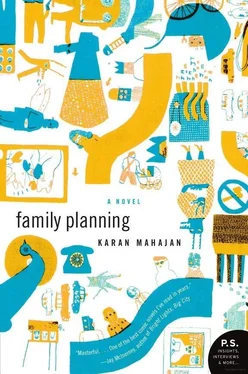But the most lasting disaster was the very first one. It occurred shortly after the Ahujas moved, and it was such a disaster that, like the popular election of an autocrat or the slippage of a cruel clause into a civil law, it didn’t even seem like one.
As Mr. Ahuja had promised, there was indeed a final party at the residence on Modi Estate Road. Politicians of all stripes were invited home. In the heat of April they ran amok on the bronzed grass of the backyard garden, undeterred: bottle-brushes bobbing overhead; gravity pulling the devalued gold currency of leaves from the seemingly infinite treasury of trees; cool cloud shadows appearing and then scudding away. The men and women mingled in ferocious patterns around snack servers and stopped dead as the hydra of Arjun’s siblings approached and swallowed them in a ritual of foot-touching and uncle-how-are-yous and auntie-will-you-have-another-whiskeys. Giant five-foot industrial fans blew hair back in gorgeous candy-floss swirls. The garden sounded like a helipad: the people, shouting in compensation, looked their natural extremes. Bald men got windy combovers, lone strands wipering their shiny pates, and women who had spent hours dyeing themselves a stylish salt-and-pepper found white buffs foaming up without warning.
It was through this scene that Mr. Ahuja pranced with a drink in either hand, enacting a new level of aggression, speaking freely, being boisterous and gruff, sharking after the chicken tikkas and kathi rolls and mushrooms and whatnots. It was as if he’d forgotten he was the host. He was enjoying politics again.
Arjun, too, was enjoying politics. He drank too much and shook hands with an army general who gripped his right hand so tight that he couldn’t turn a tap for days (or masturbate) and flirted with a woman twice his age and then puked into a bed of salvias in the garden.
But none of this was disastrous. Nor was the fact that Aarti grew increasingly tired on the morning ride, escaping from Arjun daily on the checkerboard of seats on the bus; that he got used to thinking of her not as a girl he liked but as a flickering Polaroid that was destined to fade till it was no more and he boarded a new bus in a new life in an era of utter darkness; or that the band, the Flyover Yaars, met two times in a cavernous auditorium to practice and came to the simultaneous conclusion that they sounded like a chorus of eunuchs demanding money at a marriage; or even that Ravi called Arjun up one morning and said, “You won’t believe what happened,” and Arjun said, “What?” and Ravi said, “That girl we hit in the car died. Complications, yaar,” and Arjun sobbed like a baby for a minute — What are friends for if you can’t sob in front of them? — until Ravi told him he was only joking, man, and did he want to go with him to give flowers to that babe?
“My Dad wants me to do it,” he explained.
Arjun refused and was more than a little sharp with Ravi. And still nothing bad happened. Ravi just cackled and cackled and told him another story. The friendship was sustained. The band became for a while a complex in-joke, mentioned with smoky guffaws when they stood in a secret alcove behind the basketball court during games period and traded cigarettes.
None of this was disastrous.
Then the ministerial lease on the house expired, and one obscenely sunlit July morning — after what had seemed like a month of textile milling (Sangita, do we really need to keep all fifty sweaters?), and shocking discoveries (the house shed carrom tokens like lice), and a protracted study of the graying polka dots running up and down the formerly white walls (What were these? Remnants of the days when Arjun and Varun played cricket inside the house and smacked the ball against the wall?) — the Ahujas were back in Rakesh’s family home in Greater Kailash.
Here, things began to go sour. There wasn’t enough space, it was a house made for four. It was a house as pressure cooker. The twin girls, Gita and Sonali, made a debut into the world of walking; they developed a fixation with the corked jar of mango preserves that sat in the storage room with a big rubber band tied around its glass top, and had to be shooed away from all the sharp corners by a team of bossy brothers. Mrs. Ahuja, meanwhile, was exiled to the lower-level of the two-storied house, where she lived a somewhat solitary existence, surrounded by servants whom she couldn’t stand. The reason for the exile was that there were no bathrooms on the second floor, and her trips to the toilet were, as a side effect of her pregnancy, extremely frequent.
As for sex, there was none on either level. And there would be none.
Arjun and Mr. Ahuja were mostly absent. But most of their time was spent not on productive real-world tasks — in Mr. Ahuja’s case, drinking with his financiers and moneymen or dashing off enraged letters to newfound nemeses; in Arjun’s case, sweetly failing a math exam, making a botched but sincere attempt to impress girls with the story of his flyover follies, or daydreaming his way onto the new bus with eyes trained instinctively toward Aarti, who was missing, being troubled now no doubt by some other boy in an alternative cuboidal universe on wheels — but in a car together, fretting, fuming, getting nowhere.
Mr. Ahuja missed the simple pleasure of the red emergency siren on his official car — a siren he’d misused gloriously to part the civilian seas of the city. The traffic in Delhi had in the last few months gone from awful to horrendous. The first phase of the Flyover Fast-Track was over, but the flyovers were yet to be opened. They’d been built and painted and even tousled with greenery; what they lacked was inauguration.
It was a problem of protocol, then. A flyover could not be officially opened unless a minister came with an army of cronies and a coconut, and then had one of the cronies smash the coconut on the tarred ramp of the overpass. Easy enough, except there were no free ministers to speak of. The Mohan Bedi — Rupa Bhalla Government, or the Sixth Front, collapsed soon after Vineet Yograj realized that Prime Minister Mohan Bedi, despite his childishness, could not be bought or manhandled — he was rich and burly — and so decided to withdraw support, which was why the ministers had better things to do than throw coconuts at concrete.
In the weeks of confusion and electoral horse-trading that ensued, the citizens of Delhi grew tired of driving, waiting, crashing, honking, screaming, and generally drumming their fingers on the boiling dashboards of their dented cars.
Then, one day, a few vigilantes, aided by an activist TV channel, arrived at the Godse Nagar Flyover, removed — with great and exaggerated heaving-and-hoeing — the yellow police barriers blocking the ramp, and drove their scooters and motorcycles up and down the ridged road.
A point had been made, but it wasn’t noted. The barriers were put back in place by the police, and the flyover slumbered again on the horizon. No one felt this was a disaster.
Except Mr. Ahuja. He couldn’t take it anymore. He had tried to use the extra time in the car to whisper stories about Rashmi to Arjun (he gifted to his son the cricketer tie), but was soon convinced of the futility of these efforts. Having told the secret had made Rashmi recede even further, and what was the point of revisiting her simply to confirm the fact of his forgetting?
He began instead to complain constantly about the flyovers. He had a right to take the delay personally. “This is utter bosh,” he said. And because Arjun was now Mr. Ahuja’s right-hand man, he couldn’t take it anymore either. “Yes, bosh,” said Arjun.
This is when The Flyover Yaars had their second coming.
Ravi and Arjun and Anurag and Deepak began convening at the base of finished but unopened flyovers — cheered again by the same bored, activist TV channel — and began performing rejigged songs by Bryan Adams. “Summer of ’69 Flyovers,” and “Everything I Do (I Do It for a Flyover)” were among their notable numbers. Ravi was present because he’d been able to convince his father that not only could he get a college essay for U.S. universities out of this but he could also claim this was community service, which, actually, it was not. The Flyover Yaars were astonishingly bad. No one who heard them liked them, and most people didn’t hear them at all. One critic described them as “listening to a man blow noisy balloon animals, except that he is still at the shape-choosing stage.” Whatever that meant. They were all set-up and no follow-through. Here’s why. Arjun would get up to the microphone and watch the slipstreams of passing cars chase plastic cups and tissues and bags of chips across the concrete and imagine he was in a slow-motion MTV music video. Behind him, Ravi would rotate endlessly in his asteroid belt of drums; Deepak would double further and further into himself as he freed a grueling solo from his Stratocaster; and Anurag, hunched over his keyboard, cheating spontaneity with pre-programmed tunes, would look like a beautiful slouching monster. The high-voltage orange floodlights would shine through a cloud of winged insects and onto the waiting crowd (if ten people make a crowd), exposing eyebrows choreographed in a beautiful dance of perplexity, hands turning blue around cold glasses fizzing with cold drinks. A couple of people would speak into their cell phones. Then the police would arrive in jeeps and drive them all away.
Читать дальше












